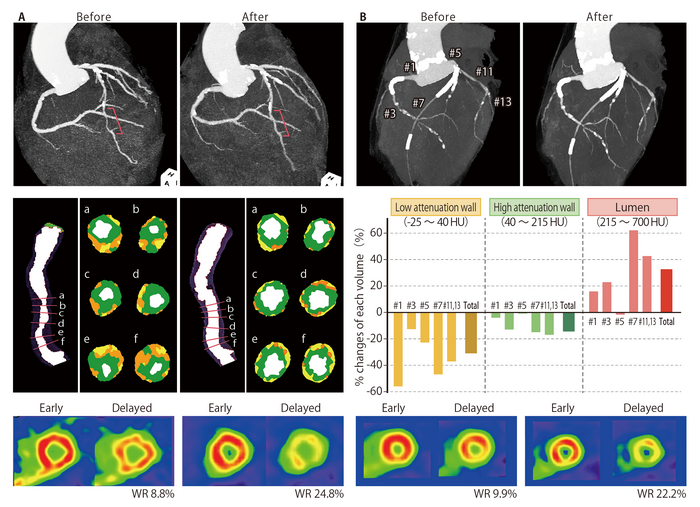Osaka, Japan – When we were little, our parents told us to take our vitamins so we could grow big and strong. Now, researchers from Japan find that one particular supplement may even fix a broken heart.

Credit: 2022, Ken-ichi Hirano, Remarkable regression of diffuse coronary atherosclerosis in patients with triglyceride deposit cardiomyovasculopathy., European Heart Journal
Osaka, Japan – When we were little, our parents told us to take our vitamins so we could grow big and strong. Now, researchers from Japan find that one particular supplement may even fix a broken heart.
In a study that published recently in European Heart Journal, researchers from Osaka University have revealed that a dietary supplement can dramatically reverse the signs of heart disease in a subset of patients.
Coronary artery disease (CAD), which involves narrowing or even closing of the arteries of the heart and often leads to heart attack, is a major cause of death worldwide. Despite the existence of treatments such as cholesterol-lowering drugs and drug-eluting stents—a new stent technology for local drug delivery—death from this condition is still common, and some patients appear to be resistant to treatment.
“Almost 15 years ago we identified a new type of CAD called triglyceride deposit cardiomyovasculopathy (TGCV), in which the coronary arteries are occluded by triglyceride deposits generated by defective intracellular breakdown of triglycerides in vascular smooth muscle cells,” says lead author of the study Ken-ichi Hirano. “This mechanism makes TGCV distinct from classic cholesterol-induced atherosclerosis, and accounts for patients who are resistant to standard remedies for CAD.”
The researchers had developed diagnostic criteria for TGCV, and shown that this condition is especially prevalent in patients with diabetes mellitus and those who have undergone hemodialysis. Despite the ability to diagnose this condition, however, an effective treatment for these patients remained elusive.
“Now we report a remarkable regression of diffuse coronary atherosclerosis in two patients with TGCV,” states Ken-ichi Hirano. “Both had suffered from refractory chest pain and diabetes until diagnosis with TGCV, and subsequent dietary intake of tricaprin led to symptom relief.”
Tricaprin is a commercially available food supplement that promotes lipid breakdown by heart muscle cells. In addition to relieving these patients’ troublesome and painful symptoms, tricaprin also resulted in remarkable regression of the triglyceride build-up in the blood vessels of the heart.
“While atherosclerosis regression following decreased serum lipid levels is well-described, this is the first report of regression due to increased triglyceride lipolysis within cells, and as such is a conceptually novel treatment for coronary atherosclerosis,” says Ken-ichi Hirano.
Given that not all patients respond to current treatments for CAD, the findings from this study pave the way toward establishing a multi-faceted approach to CAD treatment. The dramatic results achieved by administering a readily available dietary supplement hold promise for patients who would otherwise continue to suffer the debilitating effects of this disease.
###
The article, “Remarkable regression of diffuse coronary atherosclerosis in patients with triglyceride deposit cardiomyovasculopathy,” was published in European Heart Journal at DOI: https://doi.org/10.1093/eurheartj/ehac762
About Osaka University
Osaka University was founded in 1931 as one of the seven imperial universities of Japan and is now one of Japan’s leading comprehensive universities with a broad disciplinary spectrum. This strength is coupled with a singular drive for innovation that extends throughout the scientific process, from fundamental research to the creation of applied technology with positive economic impacts. Its commitment to innovation has been recognized in Japan and around the world, being named Japan’s most innovative university in 2015 (Reuters 2015 Top 100) and one of the most innovative institutions in the world in 2017 (Innovative Universities and the Nature Index Innovation 2017). Now, Osaka University is leveraging its role as a Designated National University Corporation selected by the Ministry of Education, Culture, Sports, Science and Technology to contribute to innovation for human welfare, sustainable development of society, and social transformation.
Website: https://resou.osaka-u.ac.jp/en
Journal
European Heart Journal
DOI
10.1093/eurheartj/ehac762
Method of Research
Case study
Subject of Research
People
Article Title
Remarkable regression of diffuse coronary atherosclerosis in patients with triglyceride deposit cardiomyovasculopathy.
Article Publication Date
30-Dec-2022




